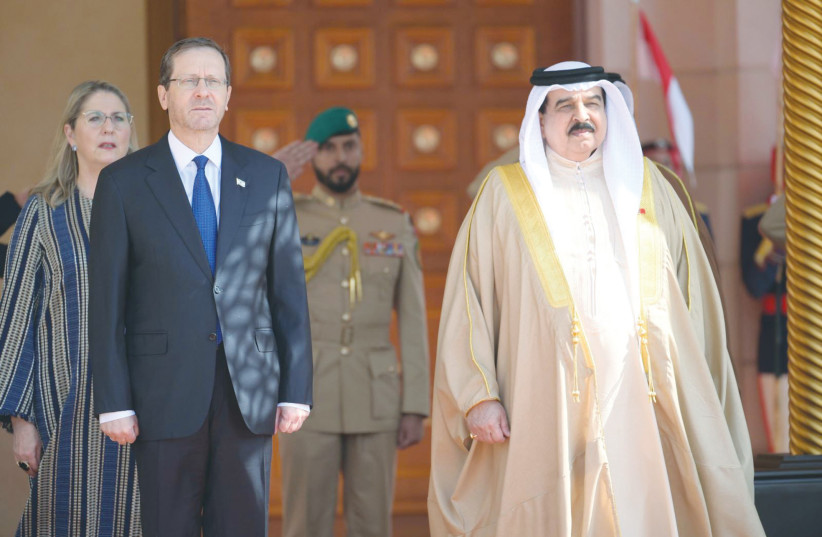Bahrain seeks to balance anger over Gaza with ties to Israel, US
Bahrain has been walking a political tightrope since war erupted in Gaza as it seeks to ease public fury at a conflict that has killed thousands of Palestinians while preserving a deal with Israel that brought the Gulf state closer to the United States.
For tiny Bahrain, home to the US Navy Fifth Fleet, close US relations are a vital bulwark against Iran, a vast Muslim Shi’ite nation across the Gulf that Manama has long blamed for stirring up its own majority Shi’ite population against Bahrain’s Sunni monarchy.
The deal to normalize ties with Israel, signed in 2020 by Bahrain when Donald Trump was president, brought few business benefits to Bahrain, unlike those it offered the United Arab Emirates, a regional commercial hub which signed at the same time. But the other strategic gains Bahrain secured are too valuable to jeopardize, sources and analysts said.
Six sources familiar with the matter told Reuters Bahrain would not abandon its ties with Israel, even though parliament – a body that remains subservient to the monarchy – has made a strident statement suggesting Israel relations were in the freezer.

Bahrain is trying to preserve the relationship with Israel while also managing public opinion, one of the sources said.
Bahrain’s government communications office did not respond to emailed questions on the status of relations with Israel.
“They can’t abandon normalization with Israel without endangering this whole strategic framework,” said Kristin Smith Diwan, a researcher at the Arab Gulf States Institute in Washington.
She said the framework was not just about keeping close to the US but also Bahrain’s signing of the deal brought it closer to the wealthy UAE and offered a counterweight to the influence of Saudi Arabia, which has long bankrolled Bahrain whose oil resources long ago dwindled to almost nothing.
“Bahrain’s adoption of the Abraham Accords is as much about its relations with other countries as it is with Israel,” she said, using the term for the normalization deals Israel signed with Bahrain and the UAE.
Yet it requires a balancing act by Bahrain, as it seeks to keep the deal intact while reflecting its deep disagreement with Israel’s fierce military campaign in Gaza, whether through criticism of Israel by the Bahraini crown prince at a security summit in Manama this month, parliament’s statements or the government allowing public protests on the issue.
AMBIGUITY ABOUT ISRAEL
On Nov. 2, the elected parliament, which has no authority over foreign policy, issued an unusual statement saying the ambassadors of Israel and Bahrain had departed and economic ties had been cut.
“The Zionist entity’s (Israel) ambassador has left from Bahrain, hopefully not to return,” parliamentarian Mamdooh Al Saleh said in parliament in the days after the announcement.
The fact that the statement on diplomatic and economic ties came from the parliament, not the foreign ministry, stirred ambiguity about whether or not Bahrain had formally cut ties.
Israel responded that relations were stable and a subsequent statement by Bahrain’s government only mentioned the envoys had already left without clarifying any reason. The Bahraini government made no mention of economic ties, which are modest.
The six sources familiar with the matter said parliament’s announcement did not reflect government policy.
The sources said the public confusion over relations with Israel appeared to have eased pressure on the government in its efforts to balance domestic outrage and ties with Israel.
In Jerusalem, a senior Israeli official told Reuters the envoys would return “when the situation allows.”
On the street, emotions are running high over Israel’s assault on Gaza which began after terrorists from the Palestinian group Hamas launched a devastating attack on Israel that killed about 1,200 people. More than 14,000 people have been killed in Gaza.
PROTEST RALLIES
Hundreds of Bahrainis have marched at rallies to show solidarity with Palestinians and protest at the kingdom’s ties with Israel, demonstrating in a nation that has typically clamped down on any form of protest, particularly if it targets government policy.
“People are angry. The government needs to release the pressure,” said Smith Diwan, referring to a decision by the authorities to allow citizens to stage weekly protests. She described apparent state tolerance of the protests as “jarring,” reflecting a contrast with Bahrain’s normally tight security.
The government came down hard on protests in 2011 when demonstrators, many from the Shi’ite majority, rose up to demand the downfall of Bahrain’s monarchy in the Arab Spring. Bahrain partly blamed that unrest on Iran, an accusation Tehran denied.
Almost a decade later when Bahrain signed the Abraham Accords, worries about Iran again formed the security backdrop, with the Islamic Republic still seen by Gulf Arabs as an expansionist security threat to much of the Middle East.
Western officials said the accords reinforced Bahrain’s US ties, pointing to a defense pact signed this year.
Israel, largely cut off economically and politically for decades from its Middle East neighbors, saw the accords as a shift in regional dynamics and an opening for new trade ties.
“I’ve seen here clear signals from the Arab Gulf countries that they don’t want to let go of what has been achieved in the last three years,” Tobias Lindner, a German foreign office minister of state told Reuters at a summit this month in Manama.
“The government of the Kingdom of Bahrain is a staunch supporter of the Abraham Accords,” he said.
The UAE, a regional power, also intends to maintain its relationship with Israel, which has yielded billions of dollars in trade and close security cooperation, sources have said.
In contrast, Bahrain-Israel trade remains modest, worth about $30 million since 2021, according to Israeli government data.





Comments are closed.